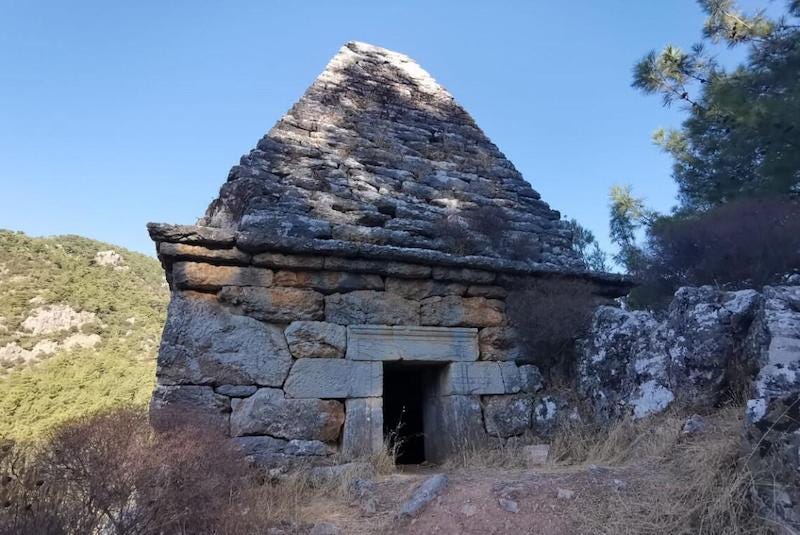A Woman at the Olympics
"Immortal Pindar's hymn"
In 2018 an ancient tomb in southwest Turkey was revealed to be that of the Greek boxer Diagoras of Rhodes (c. 490-430 BC).
Diagoras was a famous figure in ancient Greece, the winner of numerous Olympic boxing championships. His three sons and two grandsons also won Olympic victories. His daughter Pherenike had married an athletic coach, and when he died she continued to train their son herself. On the day that the young man competed, Pherenike attended the Games disguised as a man, since married women were barred from attending - on pain of death. When he won his event, she jumped up in delight, revealing her identity.
She was duly hauled before the Olympic Judges (Hellānodikai), and cited in defence of her action the Olympic successes of her family members. She reminded them that her father’s boxing triumph was celebrated in a magnificent Ode (the 7th Olympian) by the greatest poet-songwriter of the age, Pindar. The Judges were swayed, and praised Pherenike for her dedication. She was given the honorific name Kallipateira (‘of noble father’).
The poet Loréntzos Mavilis (1860-1912) wrote a beautiful sonnet entitled Kallipateira which I translate here:
“O noble Rhodian lady, how come you here, explain. By ancient custom, women are barred from this domain!” “I have a nephew, Eukles, who won Olympic fame. My father, son, three brothers, are honoured for the same. So you are bound, good Judges, to let me honour now those glorious men, who wrestled to win the hero’s bough. I praise their manly natures — no common woman I! — my kinsmen shine for ever with light that does not die. Inscribed on sparkling marble their names will never dim. They gleam in golden verses: immortal Pindar’s hymn!”
Αρχόντισσα Ροδίτισσα, πώς μπήκες; Γυναίκες διώχνει μια συνήθεια αρχαία εδώθε.” “ Έχω έν’ ανίψι, τον Ευκλέα, πατέρα, γιο, τρί’ αδέρφι’ Ολυμπιονίκες. Να μ’αφήσετε πρέπει, Ελλανοδίκες, κ’ εγώ να καμαρώσω μές στα ωραία κορμιά, που για τ’ αγρίλι του Ηρακλέα παλεύουν, θιαμαστές ψυχές αντρίκες! Με τες άλλες γυναίκες δεν είμ’ όμοια· στον αιώνα το σόι μου θα φαντάζει με της αντρειάς τ’ αμάραντα προνόμια. με μάλαμα γραμμένος το δοξάζει, σ’ αστραφτερό κατεβατό μαρμάρου ύμνος χρυσός τ’ αθάνατου Πινδάρου!



Loved reading the poem in both languages. Need to read more of Pindar’s work. One thing I wondered is why it was believed to be an islamic site (possibly did you mean tomb?) as it was a 2,400 year old tomb and the area was inhabited by Greeks that ling ago. Islam didn’t exist 2,400 ago isn’t it just over 1,400 year old religion?
Who was more egalitarian toward women: Greece or Rome? Or does that honor belong to ancient Egypt? Or (the worst option) was every ancient society equally unfair to the fairer sex?